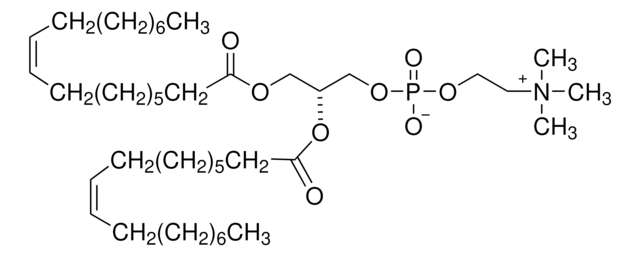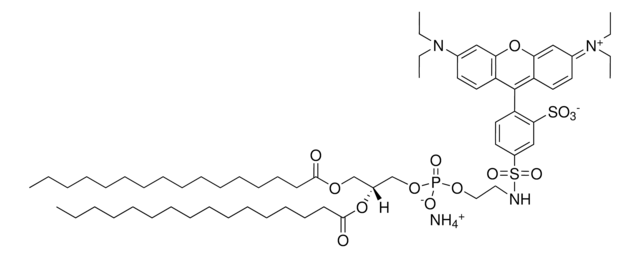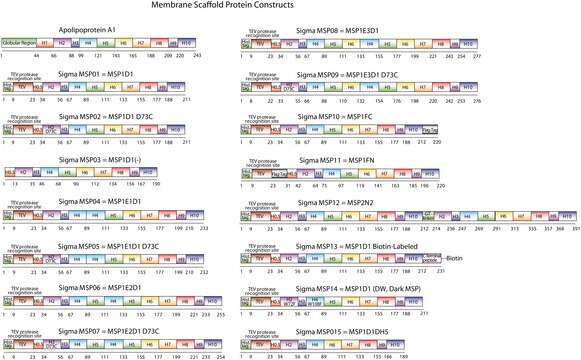P3017
2-Oleoyl-1-palmitoyl-sn-glycero-3-phosphocholine
≥95.5% (GC), ≥98% (TLC)
Synonym(s):
(7R,17Z)-4-Hydroxy-N,N,N-trimethyl-9-oxo-7-[[(1-oxohexadecyl)oxy]methyl]-3,5,8-trioxa-4-phosphahexacos-17-en-1-aminium 4-oxide, inner salt, 1-Hexadecanoyl-2-(9Z-octadecenoyl)-sn-glycero-3-phosphocholine, 1-Hexadecanoyl-2-(cis-9-octadecenoyl)-sn-glycero-3-phosphocholine, 1-Palmitoyl-2-oleoyl-sn-glycero-3-phosphocholine, 3-sn-Phosphatidylcholine, 2-oleoyl-1-palmitoyl, L-β-Oleoyl-γ-palmitoyl-α-lecithin, PC(16:0/18:1(9Z)), PC(16:0/18:1), PC(16:0/18:1w9), POPC
About This Item
Recommended Products
Assay
≥95.5% (GC)
≥98% (TLC)
form
powder
storage temp.
−20°C
SMILES string
CCCCCCCCCCCCCCCC(=O)OC[C@H](COP([O-])(=O)OCC[N+](C)(C)C)OC(=O)CCCCCCC\C=C\CCCCCCCC
InChI
1S/C42H82NO8P/c1-6-8-10-12-14-16-18-20-21-23-25-27-29-31-33-35-42(45)51-40(39-50-52(46,47)49-37-36-43(3,4)5)38-48-41(44)34-32-30-28-26-24-22-19-17-15-13-11-9-7-2/h20-21,40H,6-19,22-39H2,1-5H3/b21-20+/t40-/m1/s1
InChI key
WTJKGGKOPKCXLL-RYDYYDTQSA-N
Looking for similar products? Visit Product Comparison Guide
General description
Application
- in the liposome preparation for lipid binding assay of monogalactosyldiacylglycerol synthase (MGD1) activity in plant samples
- in the preparation of liposome for fusion with human umbilical vein endothelial cells (HUVEC) to monitor interleukin1 induced clotting process
- with trioleoylglycerol for phase separation studies
Biochem/physiol Actions
Storage Class Code
11 - Combustible Solids
WGK
WGK 3
Flash Point(F)
Not applicable
Flash Point(C)
Not applicable
Personal Protective Equipment
Certificates of Analysis (COA)
Search for Certificates of Analysis (COA) by entering the products Lot/Batch Number. Lot and Batch Numbers can be found on a product’s label following the words ‘Lot’ or ‘Batch’.
Already Own This Product?
Find documentation for the products that you have recently purchased in the Document Library.
Customers Also Viewed
Articles
Read our article about how the Nanodisc system allows for structural studies of membrane proteins.
Our team of scientists has experience in all areas of research including Life Science, Material Science, Chemical Synthesis, Chromatography, Analytical and many others.
Contact Technical Service











